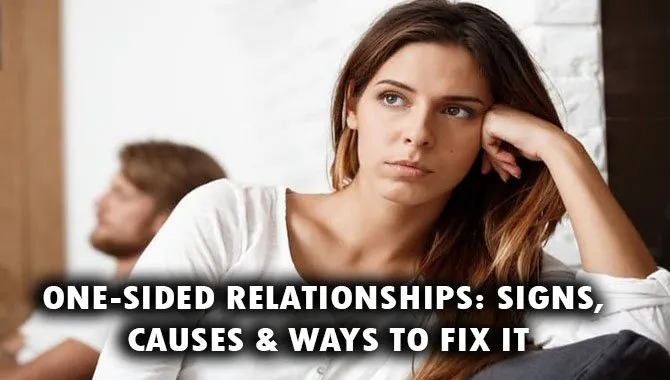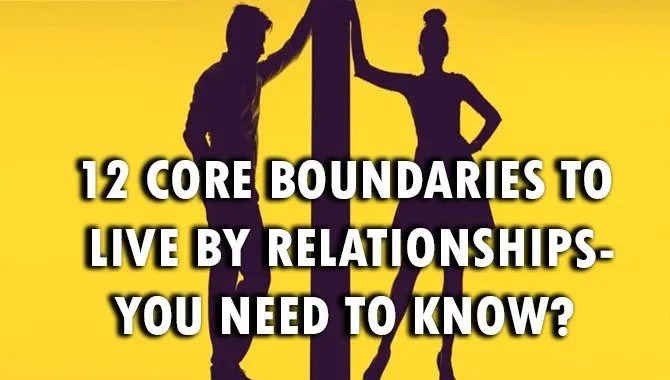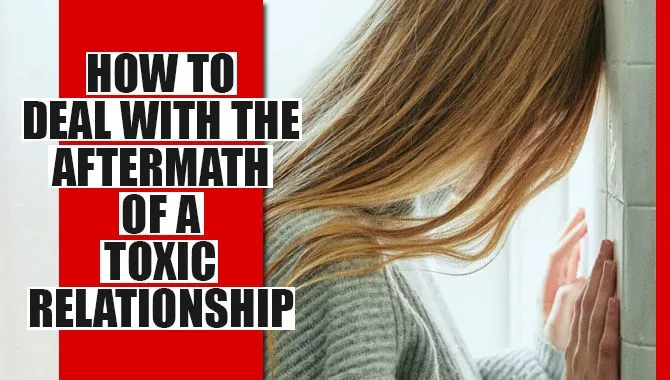If you’ve ever found yourself in a one-sided relationships, you’re not alone. According to a recent study, inappropriate relationships are one of the world’s most common types of connection. That’s why it’s essential to know the signs of one-sidedness. And how to end a relationship if it’s becoming one-sided. In this blog post, we’ll explore each of these topics in-depth. So read on to learn everything you need to know about bad relationships.

What Is A One-Sided Relationship?
There’s nothing worse than feeling like you’re in a one-sided relationship. If you’re unsure what that feels like, look at the signs below. In a one-sided relationship, one person takes control and dominates the other. This can come in the form of verbal and emotional abuse and neglect.
here are many causes of a one-sided relationship, but the most important thing is identifying and fixing them. Communication is critical in setting a one-sided relationship, as is understanding and respecting the other person’s feelings.
Remember that getting out will take time and patience if you feel stuck in a one-sided relationship. Don’t give up on your relationship – with a little effort. You can get it back on track and feel happier than ever before.
Signs Of A One-Sided Relationship
Relationships can be a beautiful thing, but they can also be challenging and one-sided. If you’re noticing any of the signs below, it’s time to take a step back and assess the situation.
Talk to your partner about what’s happening and see if there’s a way to work through the issues. If not, it might be time to end the relationship for your own safety and well-being. Keep in mind that one-sided relationships are never healthy, and it’s important to break free before it’s too late.
If your relationship is going too far in one direction, then you may be in a one-sided relationship. Here are some signs that your relationship is headed down that road:
- You feel like you’re always the one doing all the work in the relationship.
- You’re constantly defending or justifying your actions to your partner.
- You’re not allowed to have any disagreements or dissenting opinions, or you’re constantly reprimanded for them.
- You feel like your partner only cares about themselves and doesn’t care about you at all.
- You don’t feel like you have any say in what happens in the relationship, and your partner controls everything.
- You feel like your partner never listens to you.
- You feel like your partner always takes the wrong side of arguments.
- You feel like your partner never takes care of you.
- You feel like your partner never makes time for you.
One-Sided Relationship Causes
One-sided relationships can be a real pain in the neck. They can develop for various reasons – feeling overwhelmed, stressed, resentful, or just plain stuck. The key to fixing them is accepting responsibility for our part in the problem. This means being honest about how we’re feeling and communicating openly and honestly with our partner.
It can also help us to take some time for ourselves. We can do things that make us feel good, like reading, going for walks, or spending time with friends. Once we’re in a better place, and our partner is aware of our needs, working on repairing the relationship can start. Here are some causes of one-sided relationships.
Poor Communication Skills
Poor communication skills can lead to some frustrating problems in a relationship. Not being clear about what you want from the relationship, expecting the other person to do all the work and not taking any initiative, putting your own needs before the other person’s, and repeating negative patterns are just some of them.
If you’re unhappy with your current communication situation, it might be time to improve it by addressing each issue. Once you have done that and things are starting to strengthen between you, continue working on building a solid foundation for future healthy relationships.
Insecurity
Feeling insecure can be a trap that one-sided relationships easily fall into. Trying to fix things through communication only ends up making the problem worse, as it allows for resentment and mistrust to build.
Instead of trying to ‘fix’ things, it’s essential first to identify the insecurity in question and acknowledge it. From there, work on healthy coping mechanisms, so the relationship doesn’t spiral out of control again.
Conflicting Expectations
Conflicting expectations can often lead to a one-sided relationship. When this happens, the two parties involved tend to experience a lot of resentment and tension.
Discussing the issue openly and trying to compromise to fix the situation is essential. If that fails, setting boundaries may be necessary to protect both parties from further hurt feelings or emotional damage.
It can sometimes be hard to realize when a relationship has gone wrong – but with patience and effort, things can eventually change for the better.
Individual Problems
Sometimes it can be challenging to break free from a one-sided relationship. We are many because of how or our emotions. If this is the case, talking about the problem openly and seeking help from friends or family can help resolve the issue.
Understanding why things have gotten so bad and recovering from that point onward will also play an essential role in healing any hurt feelings.
Attachment Styles
Attachment styles are a big part of our relationship dynamics. They can play a decisive role in how we experience and handle one-sided relationships. In a one-sided relationship, we often become emotionally dependent on the other person. This invariably leads to us placing all our worth on them and craving their approval.
Passive-Aggressive Behavior
Passive-aggressive behavior is a type of communication characterized by one person’s unwillingness or inability to be assertive. This leads to a series of passive actions, often designed to achieve the same end as the aggressive action but without drawing attention to it.
The passive-aggressive individual may criticize others without offering solutions, make excuses for their poor behavior, or behave in a way that deliberately upsets the other person.
All of this can build up over time until there is an explosion of conflict and relationship strife. If you regularly suffer from passive-aggressive behaviors, you must talk things through with your partner (or whoever else might be affected). Understanding each party’s perspective will help restore balance and harmony in the relationship, hopefully avoiding further damage.
Impact of a One-Sided Relationship
A one-sided relationship is a type of relationship in which one person dominates the other. This can have a negative impact on both parties involved because it’s usually tough to maintain a healthy and balanced relationship when one party is always getting their way.
The main problem with a one-sided relationship is that it doesn’t allow for mutual respect or trust. This makes it difficult to build genuine relationships because there’s always a risk that the other person will not be honest with you. It can also be difficult to get along because you’re always trying to figure out what the other person wants and where they stand.
Additionally, a one-sided relationship is usually emotionally unstable because it lacks stability and security. This means that it’s often hard to focus on anything else except meeting your partner’s needs, which can take away from your own happiness and well-being.
How to Change a One-Sided Relationship
Changing a one-sided relationship can be incredibly beneficial for both parties involved. For the person who wants to change their relationship, this usually means recognizing and accepting that they have been doing things wrong. This can involve admitting to yourself that you’re not happy with the way your relationship is and taking action to make changes.
For the other party, changing a one-sided relationship often means realizing that they are not in control of the situation. They may also be surprised by how much passion and effort is necessary in order to fix the problem. However, once they’re aware of these things, they’re more likely to take steps toward fixing the problem.
In either case, changing a one-sided relationship can lead to a better understanding and stronger connection between the two parties.
Be Honest About Your Relationship
When one party in a relationship starts to feel like it, they mustn’t be treated fairly and, honestly, set things right. Honesty is the key to restoring trust, which in turn will help improve communication. The best way of doing this is by starting with an upfront conversation and outlining your expectations for the relationship.
It’s also essential that both parties are willing to compromise; if one side isn’t ready to budge, the relationship might end up broken. Remember that communication is critical – otherwise, all these efforts will go down the drain sooner or later.
Try Attending Therapy
Breaking free from the conditioning and dynamics can be challenging if you’re in a one-sided relationship. However, it is worth it. Therapy is the best way to heal and start a new relationship. It can take time, but with patience and effort, therapy can help you learn how to communicate better with others- both in your current relationship as well as any future relationships that are possible.
When to End a One-Sided Relationship
We all know the drill- one-sided relationships are an everyday reality. And while they can be fun and exciting at first, they eventually start to wear on both parties. If the relationship is progressing negatively, it’s time to end things. Here are some signs that a one-sided relationship is no longer healthy or beneficial:
- The relationship becomes one-sided
- There is a lack of communication
- One person takes all the credit for the relationship
- One person dominates the relationship
- The relationship does base on one person’s emotions and feelings rather than mutual interests
- The relationship does base on power and control
- One person is always right -There is a lack of respect and understanding
- One person is always trying to control the other
- One person is constantly bringing up the past
- There is a lack of intimacy
- There is a feeling of being suffocated
- One person feels like they cannot express themselves
Conclusion
Suppose you’re stuck in a one-sided relationship. It’s time to take a step back and assess the situation. This blog post outlines the signs of a one-sided relationship and some common causes of bad relationships. We advise how to end a one-sided relationship healthily so you can move on with your life. So what are you waiting for? Start working towards fixing your relationship today.
Frequently Asked Questions
1. How Do You Know If A Relationship Is Healthy Or Unhealthy?
Ans: There are a lot of signs that can help you determine if a relationship is unhealthy. Some of the most common symptoms include:
– Unrealistic expectations,
– Physical abuse,
– Constant criticism
– Unhealthy communication patterns, in which one or both parties keep silent or communicate in a way that isn’t healthy for either of them.
2. Why Does It Matter Whether Your Relationships Are One-Sided Or Not?
Ans: When a relationship is one-sided, it can often feel like the other person is not interested in or supports you. This can lead to decreased self-confidence, negative thinking, and lower life satisfaction levels. In some cases, one-sided relationships are difficult to fix because the person who is usually not getting what they want tends to stay in the relationship even if it’s not healthy for them.
3. Should You Be Friends With Everyone You Meet, Regardless Of Whether They’re Attractive Or Not?
Ans: No one ever said being friends with everyone you meet would be easy, but it’s worth it in the long run. When we’re not allowed to be ourselves, building trust and rapport with others becomes difficult- something essential in any relationship.
4. If It Is One-Sided, What Should I Do About It?
Ans: Taking a step back and assessing the situation if you find yourself in a one-sided relationship is essential. This may include talking to your partner about the problem and seeing if they are willing to work on it. It’s also helpful for both of you if you set ground rules about communication, sharing responsibilities, and expectations.
5. Can You Help Me Overcome This Problem In My Life, Or Should I Just Let It Go?
Ans: It’s important to remember that relationships are about mutual respect and understanding – both of which are essential for a healthy partnership. If you can’t find solutions on your own, then it might be worthwhile seeking help from someone who specializes in relationship counseling.



